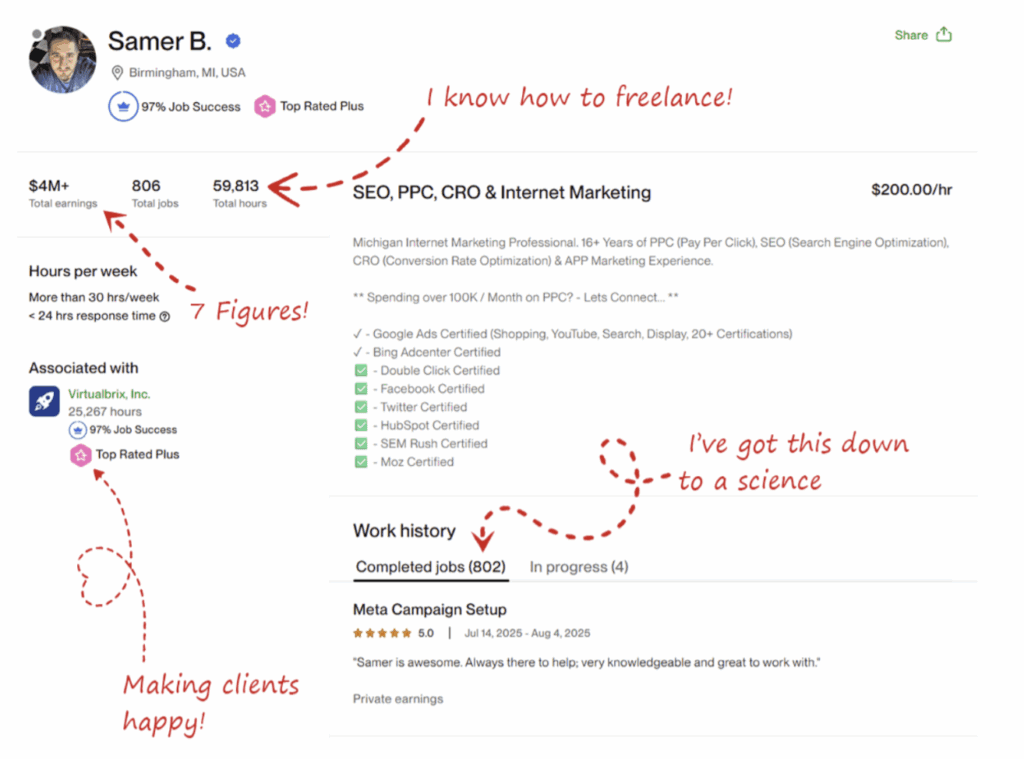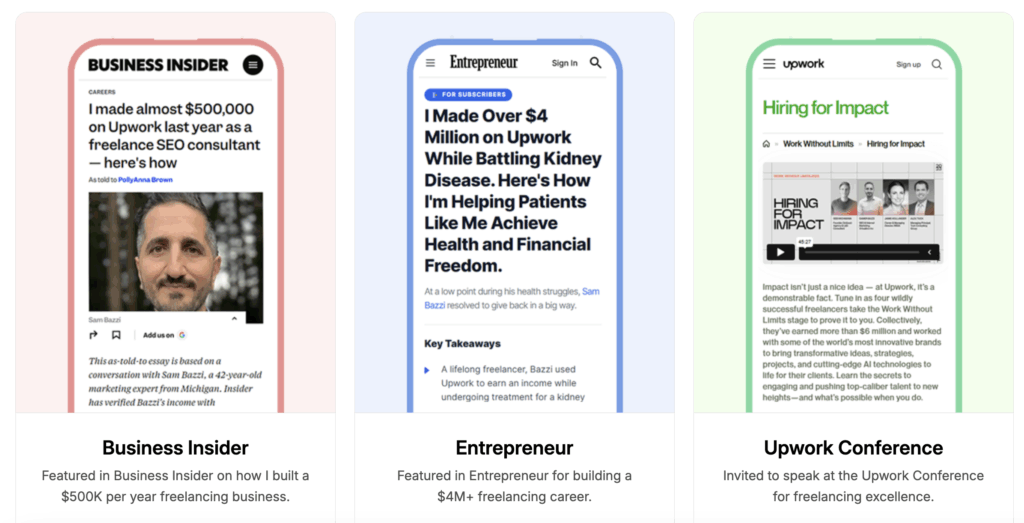Do you want to learn how to make money freelancing and work from home?
Freelancing is a flexible way to earn money from home, choose your own clients, and build a career around your skills – even if you’re just getting started and have no experience.
Today, I’m sharing an interview I had with Samer Bazzi, a successful freelancer who has earned over $4,000,000 on Upwork. Samer started freelancing in the early 2000s and has built a full-time business. He’s also the founder of a mentorship program that teaches others how to succeed on Upwork and has been featured in Upwork, Entrepreneur, and Business Insider.
In this interview, Samer shares how he got started, the steps he recommends for beginners, and his best tips for landing clients and building a long-term freelance career.
If you’ve ever wanted to become a freelancer or are interested in earning money on platforms like Upwork, this interview is packed with helpful tips, strategies, and motivation to help you take the first step.
In this interview, you’ll learn:
- The kinds of freelance services that are in demand right now
- The biggest mistakes new freelancers make
- Whether or not you should start out charging lower or aim high from the beginning
- What to do if you’re not having success freelancing
- How to get started on Upwork with no experience
- And more!
Whether you’re looking for a way to make extra money or want to build a full-time freelance business, today’s interview is a must-read.
How I’ve Made $4,000,000 Freelancing From Home
This interview is for you if you want to start making money by freelancing and working at home.
1. Can you tell us a little about yourself and how you first got started freelancing?
My name is Samer Bazzi, and I first got into freelancing back in 2004. At the time, I started by reaching out to small local businesses on Craigslist who needed websites. Even just knowing basic HTML made you a “guru” in those days, and I quickly found myself helping entrepreneurs get their businesses online.
As the internet grew with faster speeds, better technology, and the rise of mobile devices, freelancing became a real career path. I began on RentACoder, then moved to Elance, and later to oDesk. When Elance and oDesk merged, they became what we know today as Upwork.
Over the years, I experimented with many platforms, but eventually, I chose to focus on just one or two. Upwork became my home because of its scale, the trust it built between freelancers and clients, and the ability to connect with businesses all over the world. It allowed me to grow from small local projects into a career where I’ve now served hundreds of clients worldwide.

2. How much have you earned on Upwork, and what freelance services do you sell?
I’ve earned close to $4 million on Upwork. On my personal profile, I’ve accumulated around $3.4 million, and through my agency, we’ve earned roughly another $1.2 million. Altogether, that puts me between four and five million in total earnings.
It’s been a long journey, with plenty of 80-hour weeks along the way. During the pandemic, especially, client demand skyrocketed, and I found myself working around the clock. Those were some intense times, but also some of the most rewarding.
My main focus has always been paid marketing – things like PPC, CRO, and optimizing the entire funnel. That’s the work I’m most known for and where I’ve built my expertise. Over the years, I’ve taken on other types of projects, but paid marketing has always been the core of what I offer and where I deliver the most impact for clients.
3. How long did it take before you started getting consistent work on the platform?
I started in the early days when there was less competition, so it was a bit easier to land projects. Back then, even basic web skills set you apart. Today, the platform has grown, and there are far more freelancers, but that also means there are more opportunities if you know how to position yourself.
A lot of people say the market is saturated, and while that’s true in some areas, it’s also where niching down becomes powerful. The more specific your skills and focus, the easier it is to stand out. As the saying goes, the riches are in the niches.
For someone starting today, with the right approach and guidance, it’s realistic to land a first project within the first week or two. From there, it’s about building momentum, getting strong reviews, and scaling up into consistent work.
4. Did you have any fears or doubts when you started freelancing? How did you overcome them?
Like anyone starting something new, my biggest fear was the unknown. I didn’t know what to expect, so I simply set up a profile and started applying for jobs.
The first couple of gigs made all the difference because once I landed those, my confidence grew, and I realized this could actually work.
From there, I refined my approach, learning how to write stronger proposals, how to interview clients instead of just waiting for them to interview me, and how to build a clear picture of the type of clients I wanted to work with.
That shift from taking any job to being intentional about the clients I brought on helped me move past doubt and build a sustainable career.
5. What kind of services can someone sell on Upwork? What skills do you think are most in demand right now for freelancers?
You can sell almost any service on Upwork, but it’s primarily geared toward digital services.
The most common categories are marketing, programming, design, animation, and writing, but there are dozens of others that continue to grow as new industries move online.
What’s most important is matching your skill set to a problem businesses are actively trying to solve.
Right now, some of the most in-demand skills include digital advertising, copywriting, video editing, AI-related services, and, of course, software development.
Companies are also looking for freelancers who understand funnels, conversion optimization, and ways to drive measurable results. In short, the platform has room for nearly every digital skill, and if you can show results, you can build a strong career there.
6. What mistakes do you see beginners make on Upwork (and while freelancing in general) that hold them back?
The biggest mistake I see from beginners is expecting to earn quickly without first learning the platform.
Upwork has its own ecosystem, and success comes from understanding how it works – the types of jobs worth bidding on, how clients make decisions, and what makes a proposal stand out.
I always recommend starting with small projects, even if it means charging a lower rate in the beginning. Think of those early jobs as an investment, not just in building reviews and credibility but also in learning how to communicate with clients, manage expectations, and navigate the system.
Once you understand the flow and have a few strong relationships under your belt, it becomes much easier to land larger projects at higher rates.
7. How important is pricing when you’re just starting out – should you work for cheap at first or charge what you’re worth?
This is one of the most common questions I get from new freelancers, and the truth is that pricing strategy depends on where you are in your journey.
When you’re just starting out, the goal isn’t to maximize income right away but to build trust and credibility.
That usually means taking on smaller projects, sometimes at lower rates, so you can learn how the platform works, earn your first reviews, and start building relationships.
Think of it as laying the foundation. Once you have a track record and social proof, it becomes much easier to raise your rates and attract higher-paying clients who value expertise.
In other words, you may start out charging less, but you should always be moving toward charging what you’re worth.
8. What advice would you give to someone who has been applying for jobs on Upwork but hasn’t landed anything yet?
My best advice is to keep going and not get discouraged. Upwork really comes down to two approaches: volume or quality.
Some freelancers put a lot of time into crafting highly customized proposals for each job, while others focus on volume and submit as many solid proposals as possible.
Both strategies can work, but personally, I leaned toward volume. I created a strong template that showcased my skills and credibility, and then I focused on getting that in front of as many clients as I could.
The key is consistency. The more proposals you put out there, the more chances you give yourself to connect with the right client, and once you land that first job, everything becomes easier.
9. Looking back, what are the top three things you’ve done that helped you reach $4 million freelancing?
Reaching $4 million freelancing didn’t happen overnight, and I know my journey is a bit unique, but there are three things that really made the difference.
First, I focused on taking great care of clients, because strong relationships and long-term contracts are what create stability and growth.
Second, I learned to step back when a client wasn’t a good fit, which saved me from wasted time and energy and allowed me to focus on clients who truly valued my work.
And third, I made communication my number one priority. Clear updates, solving issues quickly, and staying in touch consistently kept projects on track and built trust. In my experience, strong communication is the foundation that makes everything else work.

10. If someone wanted to follow in your footsteps, what would the step-by-step process look like for them to get started with freelancing?
If someone wanted to follow in my footsteps, the first thing I’d tell them is to find a real mentor, someone who has been through the ups and downs and can help you avoid the common pitfalls.
Not the fake gurus who worked on Upwork for a couple of months, but someone with real experience and a track record. I wish I had that when I first started because it would have saved me a lot of trial and error.
The next step is to set up your account properly, build a strong profile, and choose a clear niche so clients know exactly what you do.
And finally, don’t overthink it, just start submitting proposals. The process really is simple in principle: If you’re skilled at what you do, the work is out there. The challenge isn’t finding jobs; it’s learning how to avoid the missteps and wasted time along the way, which is where guidance makes all the difference.
11. Can you share more about your mentorship program and who it’s designed to help?
If all of this sounds overwhelming, that’s exactly why I built my mentorship program.
Most freelancers spend months, even years, trying to figure this out by trial and error, and many give up before they ever get traction. My program cuts through all of that confusion and gives you a proven step-by-step road map.
I don’t just show you how to set up a winning profile – I give you the exact templates, proposal strategies, and systems I’ve used to earn over $4 million on Upwork. More importantly, you won’t be doing it alone. You’ll have me and a community behind you to hold you accountable, answer questions, and keep you moving forward.
If you’re serious about building a freelancing career that actually pays the bills, gives you freedom, and avoids the common pitfalls, then this mentorship is designed for you. Within three months, you can have a profile that stands out, a system for landing clients, and the confidence to scale your income.
Have you ever thought about freelancing from home? What kind of service would you want to sell?
Recommended reading:


Leave a Reply